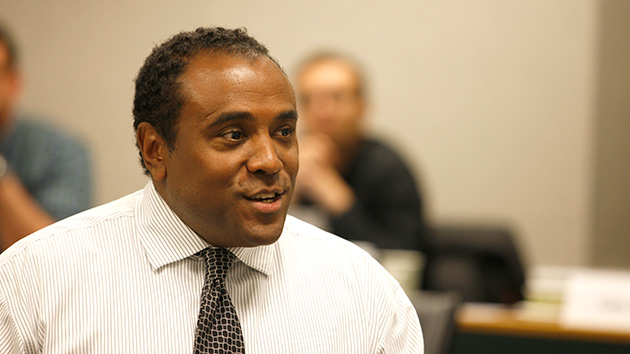Academic Director Gregory Fairchild recently presented a TEDxCharlottesville talk – The Questions that Got Me Into Prison.
Below is a related guest blog post from Tom Bandy, CEO of BandyWorks, winner of the 2010 University of Virginia Darden School Institute for Business in Society’s Tayloe Murphy Resilience Award. Bandy drew inspiration for this blog post by participating in leading a class session in the Dillwyn Correctional Center with Professor Fairchild.
——————————————————————————————————–
Standing in the Sally port waiting to enter Dillwyn Correctional Institute on a clear spring afternoon, a cold reality of prison life encloses each instructor. The course they are about to lead is an experiment to prepare inmates for successful re-entry to society. Can convicted felons operate a successful business after they complete their sentence?
Mistakes and second chances
Mistakes are bad choices, actions or results. A good business plan will measure results, assess them and apply modifications to try to make things better. Hence a good plan assumes mistakes will happen and new methods be found to address them. Mistakes happen and learning results. Lessons learned create value when applied. Hence, mistakes create improvements when learning is applied.
Discussing Darden School ‘cases’ inside a prison provides a unique educational perspective. The intensity and reality of consequences and the importance of the learning are compelling. The outcome of this course literally means the difference of a free life or a return to prison. Here are a few lessons that have been learned by the inmates, this instructor argues they apply to all businesses:
#1 – Judging is not as important as learning
Every felon attending the course is a real person with real dreams and disappointments. Many people will privately discuss egregious mistakes that have been made by themselves, friends or other family members. Not many people live into their adult lives without having made serious mistakes in judgment, action or inaction. While not everyone has the same level of mistakes and associated consequences, it seems fair to think past mistakes do not define the totality of one’s character and value.
In business, those leaders that take on problems and find a way to fix or better resolve situations are deemed successful. It seems only fair that once the cost of a mistake has been addressed, then looking forward with a new understanding may be considered a success as well. While the assumption of felons repaying the costs of a mistake is challenging, the justification corresponds to normal business practice. These felons have been judged by the courts and are paying a debt via their prison sentence. How many successful businesses have been created without overcoming a lot of mistakes?
#2 – Second chances must be both earned and provided
While blind faith that convicted felons will not repeat their past mistakes is not a practical approach, there are huge economic reasons to want felons to return to society. There must be additional rules and checks in place until trust has been established. Who better than someone that has given up years of freedom to understand the value of a second chance? Those genuinely desirous of a fresh start are willing to earn trust and pay their dues. Herein lays the opportunity to apply business lessons to the approach to return of felons to society.
Great businesses provide clear responsibilities, process and accountability. Great leaders do not describe the explicit definition of rules, responsibilities and goals as extra work but rather necessary work. These same companies do not fire someone for a single mistake, but carefully hold them accountable for mistakes with a sincere expectation for the proper behavior to be delivered going forward. Perhaps, with time and experience, a set of reasonable rules can be applied that balance cost of second chances for felons.
#3 – What goes around comes around
The obvious point here is that felons made bad choices and incarceration resulted. Another point, though less obvious, is that second chances are valuable for both the giver and the recipient. Offering someone that has failed badly a chance to earn respect and honor from their own effort is an enormous gift. The interesting point of those involved with the prison program, however, is that the instructors often discuss how much they receive rather than how much they have given.
This lesson also applies directly to business. Applying accountability with a staff member demonstrates that their work is important and provides the encouragement of high expectations. Tracking results and teaching the lessons of mistakes leads to staff ownership and productivity – a gift that will return many times to an owner.
#4 – Prioritize well and choose accordingly
Prison accountability is much more severe than that of its business counterpart. Small business people face challenges of time with their family, for themselves and face intense financial risks. Inmates lose access to their family almost entirely, cannot support them and face intense humiliation. The cost of their choices is severe and long lasting. The value of priorities and discipline is illuminated when the harsh consequences of bad priorities and lack of discipline are encountered in a prison.
Such a ‘case’ makes a great lesson for any entrepreneur. Choices have consequences and actions must be prioritized to use those that yield the best results. Every business has more tasks than time. The need to make the right choices and use time well is an important key to success. There is an intense pressure to execute at a high level. Such pressure can lead to fatigue, bad choices and over-analysis. The inevitability of mistakes and the ability to learn and earn a second chance paradoxically frees one to move forward with less stress and more confidence. Do your best, learn from your mistakes, forgive yourself and go make things better.
As the last sally port gate opens the instructors pick up their phones and keys and head home in the now cold dark night. The emails, voice message and texts have queued up during the class. While the answer to second chances for felons is yet to be known, at least one instructor knows that he has learned lessons and will use his second chance tomorrow to apply those lessons to his reset priorities.
This post originally appeared as Accountability Lessons from Prison at http://bandyworks.com/accountability-lessons-from-prison/





